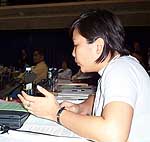
17 MAY 2000
Statement to the Working Group on Access to Genetic Resources at COP 5
Madam Chair, Third World Network makes this statement on behalf of the following civil society groups:
Third World Network, Rural Advancement Foundation International (RAFI), Intermediate Technology Development Group (ITDG), Swedish Society for Nature Conservation (SSNC), Council for Responsible Genetics, SEARICE, Diverse Women for Diversity, ECOROPA, Greenpeace International, CODEFF/Friends of the Earth Chile, and Washington Biotechnology Action Council.
Madam Chair, we recognise there exists parallel international processes which have implications for access to genetic resources and benefit sharing. In this context, we urge COP 5 to ensure that the fundamental objectives of the CBD are not undermined by the TRIPs Agreement of the WTO and also, to ensure complementarity with the negotiations of the International Undertaking on Plant Genetic Resources of the FAO.
We therefore, wish to make two proposals for these purposes.
First, we urge COP 5 to send a strong message to the TRIPS Council of the WTO on the question of intellectual property rights (IPRs) over biological resources. We believe that IPRs over biological resources and patents on living forms will have serious and adverse implications for access to genetic resources and the equitable sharing of benefits. Indeed, it will undermine the very objectives of the CBD.
Madam Chair, we also wish to draw the COP's attention to the developments in the WTO. The review of Article 27.3(b) of the TRIPs Agreement is presently being considered by the TRIPs Council. Article 27.3(b) requires countries to allow for patenting of certain biological resources.
On this issue, the developing countries in the WTO have already made clear their opposition to the patenting of living forms. The African Group of countries, the Like-Minded Group and the Least-Developed Group of Countries in the WTO, have expressed their rejection of patents over life forms, and their deep concerns over the incompatibility of the TRIPs Agreement with the CBD.
We therefore, urge COP 5 to send a strong message of support for the position adopted by these developing countries, which make up the majority of countries in the developing world. This is particularly important given that the TRIPs Council will be considering the question of the review of Article 27.3(b) in June. We believe that this will be an important opportunity for COP 5 to preserve the objectives of the CBD. In this regard, we support the Norwegian proposal for active participation by the CBD in the TRIPs Council considerations.
We further recommend that COP 5 call on the WTO member countries in the review of Article 27.3(b) to clarify the following:
(a) that plants and animals as well as microorganisms and all other living organisms and their parts cannot be patented, and that natural processes that produce plants, animals and other living organisms shall also not be patentable;
(b) that any sui generis system for the protection of plant varieties can provide for the following:
- the protection of the innovations of indigenous and local farming communities in developing countries, consistent with the Convention on Biological Diversity and the International Undertaking on Plant Genetic Resources;
- the continuation of the traditional farming practices including the right to save, exchange and save seeds, and sell their harvest; and
- preventing anti-competitive rights or practices which will threaten food sovereignty of people in developing countries, as is permitted by Article 31 of the TRIPs Agreement; and
(c) that the implementation deadline should be extended to take place after the completion of the substantive review of Article 27.3(b).
We also urge governments to undertake not to grant, or to cancel where previously granted, IPRs over biological materials or over knowledge on the use of biological materials, obtained
(a) from collections held in international banks or other deposit institutions where such materials are freely available; or
(b) without the prior informed consent of the country of origin or otherwise inconsistently with the provisions of Article 15 of the CBD.
The second proposal, Madam Chair, relates to the negotiations on the International Undertaking on Plant Genetic Resources in the FAO. The aim of these negotiations is to secure an international undertakingInternational Undertaking which is adapted to be in harmony with the CBD. The mandate and scope of these negotiations have already been agreed by the FAO and is supported by COP decisions. However, this has been questioned by some countries. The conflict is largely between those who wish to see farmers and other stakeholders have free multilateral rights of access to, and benefit sharing from, genetic resources they have developed and used to maintain food security; and those who support bilateral arrangements and the encroachment of IPRs into these areas.
A strong message of encouragement should be sent to the FAO to achieve an International Undertaking, which ensures:
(a) multilateral access to these genetic resources for current and future generations, outlawing intellectual property claims on any of the materials or the genes contained therein, or knowledge in the system;
(b) benefits are linked to the end use of resources (their contributions to seeds, breeds and food security) and that the benefits to farmers are commensurate with their historical and present contribution to developing resources underpinning food security; and
(c) Farmers' Rights to save, use, exchange and sell seeds and other propagating material and, in the case of seeds and other materials, restricted by national law, the right to sell them in their customary manner and markets.
We, therefore, urge COP 5 to give its support for an International Undertaking embodying these fundamental elements, and to call for it to be brought to the next COP as a legally-binding instrument.

Cecilia Oh of Third World Network, presenting the Joint NGO statement in the Access workshop.
What is COP V?
Agricultural biodiversity
CBD vs WTO
ITDG's position
Abc research
Sustainable livelihoods workshop
ITDG Home Page
© Copyright ITDG 2000